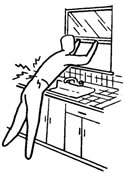 Human Factors and Ergonomics (HFE) is a branch of science, which is concerned with man's interaction with his universe. Thus, it is not simply the study of pure science (e.g. sound or light), but rather man's understanding and reactions (e.g. to hear and see). Similarly, man's perception and reaction to stimuli such as flashing lights, buzzers, alarms, and warnings and instructions are areas with which human factors is concerned. In addition, the ability to perform tasks under various environmental conditions is also of concern. The HFE society is represented in almost equal numbers by psychologists and individuals in the physical sciences who cooperate to solve.
Human Factors and Ergonomics (HFE) is a branch of science, which is concerned with man's interaction with his universe. Thus, it is not simply the study of pure science (e.g. sound or light), but rather man's understanding and reactions (e.g. to hear and see). Similarly, man's perception and reaction to stimuli such as flashing lights, buzzers, alarms, and warnings and instructions are areas with which human factors is concerned. In addition, the ability to perform tasks under various environmental conditions is also of concern. The HFE society is represented in almost equal numbers by psychologists and individuals in the physical sciences who cooperate to solve.
Expertise
We have extensive experience in many aspects of human factors including:
- Participating in ANSI safety committees and warning label task forces.
- We have an extensive library dealing with safety warnings and human body sizes and strengths.
- We have been active members of the HFE society for many years.
Questions Answered
Through scientific analysis, we can help you answer pertinent questions such as:
- Was the warning clear, unambiguous and well placed?
- Was sufficient lighting available to avoid tripping in the parking garage?
- Was the ceiling too low for public use of a particular area?
Case Examples
Pool Diving Accident:
A young lad attended a Bible-Class function at which a 3½ foot high swimming pool was supplied for recreation. The boy dived into the pool off a trampoline supplied on the pool's deck. He struck his head rendering him a paraplegic. He received a substantial settlement after we analyzed the accident and determined that it was caused by grossly negligent adult behavior and inadequate supervision.
Tall Man Strikes Head on Public Ceiling:
An unusually tall (6' 5") man struck his head in a municipal garage when walking to his parked car. The case settled after we pointed out that the location of his injury was well lit and not in a pedestrian passageway. Furthermore, we argued that being in the upper 1% in height of the population, that he has had to spend his entire adult lifetime avoiding low doorways, overhead staircases, chandeliers, and plane cabins and entrances.
Kristopher J. Seluga, PE, is a Mechanical Engineering, Accident Reconstruction, Biomechanics, and Safety Expert with over 20 years of experience. He received his Bachelor's and Master's degrees from the Mechanical Engineering department at MIT where he worked on the development of novel three-dimensional printing technologies. Mr. Seluga is also a licensed Professional Engineer in New York and Connecticut, and has served as a member of the ANSI engineering committee for the Z130.1 and Z135 standards for golf cars and PTV's. His research interests and peer reviewed publications span the topics of Motor Vehicle Dynamics, Product Safety, and Biomechanics.
©Copyright - All Rights Reserved
DO NOT REPRODUCE WITHOUT WRITTEN PERMISSION BY AUTHOR.



 Human Factors and Ergonomics (HFE) is a branch of science, which is concerned with man's interaction with his universe. Thus, it is not simply the study of pure science (e.g. sound or light), but rather man's understanding and reactions (e.g. to hear and see). Similarly, man's perception and reaction to stimuli such as flashing lights, buzzers, alarms, and warnings and instructions are areas with which human factors is concerned. In addition, the ability to perform tasks under various environmental conditions is also of concern. The HFE society is represented in almost equal numbers by psychologists and individuals in the physical sciences who cooperate to solve.
Human Factors and Ergonomics (HFE) is a branch of science, which is concerned with man's interaction with his universe. Thus, it is not simply the study of pure science (e.g. sound or light), but rather man's understanding and reactions (e.g. to hear and see). Similarly, man's perception and reaction to stimuli such as flashing lights, buzzers, alarms, and warnings and instructions are areas with which human factors is concerned. In addition, the ability to perform tasks under various environmental conditions is also of concern. The HFE society is represented in almost equal numbers by psychologists and individuals in the physical sciences who cooperate to solve.








